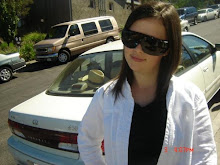 I wanted to read Cloris
I wanted to read Cloris1. I love celebrity tell-alls! (Have I mentioned that?)
2. I have read and re-read the autobiography Past Imperfect by Joan Collins
(Also, I was a little intrigued by the fact that the ex-husband co-wrote the book.)
3. I have heard a couple of stories about interviews with Cloris Leachman that suggest that she's at the age when she no longer cares about following publicists' orders and not offending anyone. (Did anyone else hear that she called Betty White a slut?) Yay, dish!
So how did it stack up? A complete disappointment!
In her introduction, Cloris states, "I decided it would be wrong to write my autobiography in chapters, because I didn't live my life in chapters. The long walk I've taken wasn't divided into tidy sections. It came in arcs and rainbows, sprints and marathons, clouds and clear places." Right. So she jumps around between times and topics, and it's impossible to put what she's writing about into context and gain any understanding from her experiences.
I admittedly prefer autobiographies to be written in a chronological context, and I prefer linear story-telling. I think it's somewhat arrogant to say "well, I didn't live my life in chapters, so how could I possibly write about it in chapters?" An autobiography is not a diary; it's meant to be read -- and enjoyed -- by other people. How do you expect readers to be able to follow along when you don't have an established method of story-telling? How is a reader supposed to put an event into context when they can't remember where you lived or if you had one child or two at that point? It's disorienting and defeats the purpose.
One of the problems with this approach is that I don't feel like I know very much about the events of Cloris's life. I think she has five children, and I know that at one point a son died. I don't know when exactly she and George Englund divorced or exactly why. She states more than once that she has won nine Emmy Awards, but I don't know for which nine projects. I know that she has two younger sisters, but I barely know anything about them or her relationships with them.
There was some celebrity dish (an epic night of love-making with Gene Hackman, anyone?) but not enough to really qualify as a "tell-all" or to believe she's not leaving the best stuff out. The Joan Collins affair? It rates a couple of paragraphs, but Cloris doesn't really relate how she felt about it or it affected the marriage. As far as George Englund goes, he is the love of her life and she of his and end of story. They are great friends and what does it matter that they see other people? That was frustrating, as I really don't understand it or relate to it. Open up a little more and tell me about it, and maybe I'll be able to see where you're coming from. Isn't that the point?
I don't recommend this book. It's not worth the amount of time it takes to read it -- and it does take a bit longer than one might expect because of the writing style. Cloris interrupts herself to go on tangents about other topics throughout, and at best is just rambling.
Instead, watch this clip of Cloris on Chelsea Lately. It will take much less time and give you an idea of how the book goes.


No comments:
Post a Comment